- Home
- Leo Tolstoy
Resurrection Page 7
Resurrection Read online
Page 7
The people continued coming out, clattering with their nailed boots on the stone steps and dispersing over the churchyard. A very old man with shaking head, his aunts' cook, stopped Nekhludoff in order to give him the Easter kiss, his old wife took an egg, dyed yellow, out of her handkerchief and gave it to Nekhludoff, and a smiling young peasant in a new coat and green belt also came up.
"Christ is risen," he said, with laughing eyes, and coming close to Nekhludoff he enveloped him in his peculiar but pleasant peasant smell, and, tickling him with his curly beard, kissed him three times straight on the mouth with his firm, fresh lips.
While the peasant was kissing Nekhludoff and giving him a dark brown egg, the lilac dress of Matrona Pavlovna and the dear black head with the red bow appeared.
Katusha caught sight of him over the heads of those in front of her, and he saw how her face brightened up.
She had come out with Matrona Pavlovna on to the porch, and stopped there distributing alms to the beggars. A beggar with a red scab in place of a nose came up to Katusha. She gave him something, drew nearer him, and, evincing no sign of disgust, but her eyes still shining with joy, kissed him three times. And while she was doing this her eyes met Nekhludoff's with a look as if she were asking, "Is this that I am doing right?" "Yes, dear, yes, it is right; everything is right, everything is beautiful. I love!"
They came down the steps of the porch, and he came up to them.
He did not mean to give them the Easter kiss, but only to be nearer to her. Matrona Pavlovna bowed her head, and said with a smile, "Christ is risen!" and her tone implied, "To-day we are all equal." She wiped her mouth with her handkerchief rolled into a ball and stretched her lips towards him.
"He is, indeed," answered Nekhludoff, kissing her. Then he looked at Katusha; she blushed, and drew nearer. "Christ is risen, Dmitri Ivanovitch." "He is risen, indeed," answered Nekhludoff, and they kissed twice, then paused as if considering whether a third kiss were necessary, and, having decided that it was, kissed a third time and smiled.
"You are going to the priests?" asked Nekhludoff.
"No, we shall sit out here a bit, Dmitri Ivanovitch," said Katusha with effort, as if she had accomplished some joyous task, and, her whole chest heaving with a deep sigh, she looked straight in his face with a look of devotion, virgin purity, and love, in her very slightly squinting eyes.
In the love between a man and a woman there always comes a moment when this love has reached its zenith--a moment when it is unconscious, unreasoning, and with nothing sensual about it. Such a moment had come for Nekhludoff on that Easter eve. When he brought Katusha back to his mind, now, this moment veiled all else; the smooth glossy black head, the white tucked dress closely fitting her graceful maidenly form, her, as yet, un-developed bosom, the blushing cheeks, the tender shining black eyes with their slight squint heightened by the sleepless night, and her whole being stamped with those two marked features, purity and chaste love, love not only for him (he knew that), but for everybody and everything, not for the good alone, but for all that is in the world, even for that beggar whom she had kissed.
He knew she had that love in her because on that night and morning he was conscious of it in himself, and conscious that in this love he became one with her. Ah! if it had all stopped there, at the point it had reached that night. "Yes, all that horrible business had not yet happened on that Easter eve!" he thought, as he sat by the window of the jurymen's room.
CHAPTER XVI.
THE FIRST STEP.
When he returned from church Nekhludoff broke the fast with his aunts and took a glass of spirits and some wine, having got into that habit while with his regiment, and when he reached his room fell asleep at once, dressed as he was. He was awakened by a knock at the door. He knew it was her knock, and got up, rubbing his eyes and stretching himself.
"Katusha, is it you? Come in," said he.
She opened the door.
"Dinner is ready," she said. She still had on the same white dress, but not the bow in her hair. She looked at him with a smile, as if she had communicated some very good news to him.
"I am coming," he answered, as he rose, taking his comb to arrange his hair.
She stood still for a minute, and he, noticing it, threw down his comb and made a step towards her, but at that very moment she turned suddenly and went with quick light steps along the strip of carpet in the middle of the passage.
"Dear me, what a fool I am," thought Nekhludoff. "Why did I not stop her?" What he wanted her for he did not know himself, but he felt that when she came into his room something should have been done, something that is generally done on such occasions, and that he had left it undone.
"Katusha, wait," he said.
"What do you want?" she said, stopping.
"Nothing, only--" and, with an effort, remembering how men in his position generally behave, he put his arm round her waist.
She stood still and looked into his eyes.
"Don't, Dmitri Ivanovitch, you must not," she said, blushing to tears and pushing away his arm with her strong hard hand. Nekhludoff let her go, and for a moment he felt not only confused and ashamed but disgusted with himself. He should now have believed himself, and then he would have known that this confusion and shame were caused by the best feelings of his soul demanding to be set free; but he thought it was only his stupidity and that he ought to behave as every one else did. He caught her up and kissed her on the neck.
This kiss was very different from that first thoughtless kiss behind the lilac bush, and very different to the kiss this morning in the churchyard. This was a dreadful kiss, and she felt it.
"Oh, what are you doing?" she cried, in a tone as if he had irreparably broken something of priceless value, and ran quickly away.
He came into the dining-room. His aunts, elegantly dressed, their family doctor, and a neighbour were already there. Everything seemed so very ordinary, but in Nekhludoff a storm was raging. He understood nothing of what was being said and gave wrong answers, thinking only of Katusha. The sound of her steps in the passage brought back the thrill of that last kiss and he could think of nothing else. When she came into the room he, without looking round, felt her presence with his whole being and had to force himself not to look at her.
After dinner he at once went into his bedroom and for a long time walked up and down in great excitement, listening to every sound in the house and expecting to hear her steps. The animal man inside him had now not only lifted its head, but had succeeded in trampling under foot the spiritual man of the days of his first visit, and even of that every morning. That dreadful animal man alone now ruled over him.
Though he was watching for her all day he could not manage to meet her alone. She was probably trying to evade him. In the evening, however, she was obliged to go into the room next to his. The doctor had been asked to stay the night, and she had to make his bed. When he heard her go in Nekhludoff followed her, treading softly and holding his breath as if he were going to commit a crime.
She was putting a clean pillow-case on the pillow, holding it by two of its corners with her arms inside the pillow-case. She turned round and smiled, not a happy, joyful smile as before, but in a frightened, piteous way. The smile seemed to tell him that what he was doing was wrong. He stopped for a moment. There was still the possibility of a struggle. The voice of his real love for her, though feebly, was still speaking of her, her feelings, her life. Another voice was saying, "Take care I don't let the opportunity for your own happiness, your own enjoyment, slip by!" And this second voice completely stifled the first. He went up to her with determination and a terrible, ungovernable animal passion took possession of him.
With his arm round he made her sit down on the bed; and feeling that there was something more to be done he sat down beside her.
"Dmitri Ivanovitch, dear! please let me go," she said, with a piteous voice. "Matrona Pavlovna is coming," she cried, tearing herself away. Some one was really coming to the door.<
br />
"Well, then, I'll come to you in the night," he whispered.
"You'll be alone?"
"What are you thinking of? On no account. No, no!" she said, but only with her lips; the tremulous confusion of her whole being said something very different.
It was Matrona Pavlovna who had come to the door. She came in with a blanket over her arm, looked reproachfully at Nekhludoff, and began scolding Katusha for having taken the wrong blanket.
Nekhludoff went out in silence, but he did not even feel ashamed. He could see by Matrona Pavlovna's face that she was blaming him, he knew that she was blaming him with reason and felt that he was doing wrong, but this novel, low animal excitement, having freed itself of all the old feelings of real love for Katusha, ruled supreme, leaving room for nothing else. He went about as if demented all the evening, now into his aunts', then back into his own room, then out into the porch, thinking all the time how he could meet her alone; but she avoided him, and Matrona Pavlovna watched her closely.
CHAPTER XVII.
NEKHLUDOFF AND KATUSHA.
And so the evening passed and night came. The doctor went to bed. Nekhludoff's aunts had also retired, and he knew that Matrona Pavlovna was now with them in their bedroom so that Katusha was sure to be alone in the maids' sitting-room. He again went out into the porch. It was dark, damp and warm out of doors, and that white spring mist which drives away the last snow, or is diffused by the thawing of the last snow, filled the air. From the river under the hill, about a hundred steps from the front door, came a strange sound. It was the ice breaking. Nekhludoff came down the steps and went up to the window of the maids' room, stepping over the puddles on the bits of glazed snow. His heart was beating so fiercely in his breast that he seemed to hear it, his laboured breath came and went in a burst of long-drawn sighs. In the maids' room a small lamp was burning, and Katusha sat alone by the table, looking thoughtfully in front of her. Nekhludoff stood a long time without moving and waited to see what she, not knowing that she was observed, would do. For a minute or two she did not move; then she lifted her eyes, smiled and shook her head as if chiding herself, then changed her pose and dropped both her arms on the table and again began gazing down in front of her. He stood and looked at her, involuntarily listening to the beating of his own heart and the strange sounds from the river. There on the river, beneath the white mist, the unceasing labour went on, and sounds as of something sobbing, cracking, dropping, being shattered to pieces mixed with the tinkling of the thin bits of ice as they broke against each other like glass.
There he stood, looking at Katusha's serious, suffering face, which betrayed the inner struggle of her soul, and he felt pity for her; but, strange though it may seem, this pity only confirmed him in his evil intention.
He knocked at the window. She started as if she had received an electric shock, her whole body trembled, and a look of horror came into her face. Then she jumped up, approached the window and brought her face up to the pane. The look of terror did not leave her face even when, holding her hands up to her eyes like blinkers and peering through the glass, she recognised him. Her face was unusually grave; he had never seen it so before. She returned his smile, but only in submission to him; there was no smile in her soul, only fear. He beckoned her with his hand to come out into the yard to him. But she shook her head and remained by the window. He brought his face close to the pane and was going to call out to her, but at that moment she turned to the door; evidently some one inside had called her. Nekhludoff moved away from the window. The fog was so dense that five steps from the house the windows could not be seen, but the light from the lamp shone red and huge out of a shapeless black mass. And on the river the same strange sounds went on, sobbing and rustling and cracking and tinkling. Somewhere in the fog, not far off, a cock crowed; another answered, and then others, far in the village took up the cry till the sound of the crowing blended into one, while all around was silent excepting the river. It was the second time the cocks crowed that night.
Nekhludoff walked up and down behind the corner of the house, and once or twice got into a puddle. Then again came up to the window. The lamp was still burning, and she was again sitting alone by the table as if uncertain what to do. He had hardly approached the window when she looked up. He knocked. Without looking who it was she at once ran out of the room, and he heard the outside door open with a snap. He waited for her near the side porch and put his arms round her without saying a word. She clung to him, put up her face, and met his kiss with her lips. Then the door again gave the same sort of snap and opened, and the voice of Matrona Pavlovna called out angrily, "Katusha!"
She tore herself away from him and returned into the maids' room. He heard the latch click, and then all was quiet. The red light disappeared and only the mist remained, and the bustle on the river went on. Nekhludoff went up to the window, nobody was to be seen; he knocked, but got no answer. He went back into the house by the front door, but could not sleep. He got up and went with bare feet along the passage to her door, next to Matrona Pavlovna's room. He heard Matrona Pavlovna snoring quietly, and was about to go on when she coughed and turned on her creaking bed, and his heart fell, and he stood immovable for about five minutes. When all was quiet and she began to snore peacefully again, he went on, trying to step on the boards that did not creak, and came to Katusha's door. There was no sound to be heard. She was probably awake, or else he would have heard her breathing. But as soon as he had whispered "Katusha" she jumped up and began to persuade him, as if angrily, to go away.
"Open! Let me in just for a moment! I implore you!" He hardly knew what he was saying.
*
When she left him, trembling and silent, giving no answer to his words, he again went out into the porch and stood trying to understand the meaning of what had happened.
It was getting lighter. From the river below the creaking and tinkling and sobbing of the breaking ice came still louder and a gurgling sound could now also be heard. The mist had begun to sink, and from above it the waning moon dimly lighted up something black and weird.
"What was the meaning of it all? Was it a great joy or a great misfortune that had befallen him?" he asked himself.
CHAPTER XVIII.
AFTERWARDS.
The next day the gay, handsome, and brilliant Schonbock joined Nekhludoff at his aunts' house, and quite won their hearts by his refined and amiable manner, his high spirits, his generosity, and his affection for Dmitri.
But though the old ladies admired his generosity it rather perplexed them, for it seemed exaggerated. He gave a rouble to some blind beggars who came to the gate, gave 15 roubles in tips to the servants, and when Sophia Ivanovna's pet dog hurt his paw and it bled, he tore his hemstitched cambric handkerchief into strips (Sophia Ivanovna knew that such handkerchiefs cost at least 15 roubles a dozen) and bandaged the dog's foot. The old ladies had never met people of this kind, and did not know that Schonbock owed 200,000 roubles which he was never going to pay, and that therefore 25 roubles more or less did not matter a bit to him. Schonbock stayed only one day, and he and Nekhludoff both, left at night. They could not stay away from their regiment any longer, for their leave was fully up.
At the stage which Nekhludoff's selfish mania had now reached he could think of nothing but himself. He was wondering whether his conduct, if found out, would be blamed much or at all, but he did not consider what Katusha was now going through, and what was going to happen to her.
He saw that Schonbock guessed his relations to her and this flattered his vanity.
"Ah, I see how it is you have taken such a sudden fancy to your aunts that you have been living nearly a week with them," Schonbock remarked when he had seen Katusha. "Well, I don't wonder--should have done the same. She's charming." Nekhludoff was also thinking that though it was a pity to go away before having fully gratified the cravings of his love for her, yet the absolute necessity of parting had its advantages because it put a sudden stop to relations it would have
been very difficult for him to continue. Then he thought that he ought to give her some money, not for her, not because she might need it, but because it was the thing to do.
So he gave her what seemed to him a liberal amount, considering his and her station. On the day of his departure, after dinner, he went out and waited for her at the side entrance. She flushed up when she saw him and wished to pass by, directing his attention to the open door of the maids' room by a look, but he stopped her.
"I have come to say good-bye," he said, crumbling in his hand an envelope with a 100-rouble note inside. "There, I . . . "
She guessed what he meant, knit her brows, and shaking her head pushed his hand away.
"Take it; oh, you must!" he stammered, and thrust the envelope into the bib of her apron and ran back to his room, groaning and frowning as if he had hurt himself. And for a long time he went up and down writhing as in pain, and even stamping and groaning aloud as he thought of this last scene. "But what else could I have done? Is it not what happens to every one? And if every one does the same . . . well I suppose it can't be helped." In this way he tried to get peace of mind, but in vain. The recollection of what had passed burned his conscience. In his soul--in the very depths of his soul--he knew that he had acted in a base, cruel, cowardly manner, and that the knowledge of this act of his must prevent him, not only from finding fault with any one else, but even from looking straight into other people's eyes; not to mention the impossibility of considering himself a splendid, noble, high-minded fellow, as he did and had to do to go on living his life boldly and merrily. There was only one solution of the problem--i.e., not to think about it. He succeeded in doing so. The life he was now entering upon, the new surroundings, new friends, the war, all helped him to forget. And the longer he lived, the less he thought about it, until at last he forgot it completely.

 The Death of Ivan Ilych
The Death of Ivan Ilych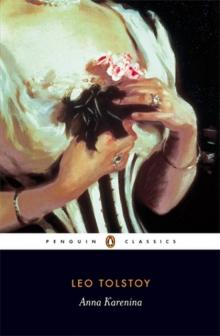 Anna Karenina
Anna Karenina Resurrection
Resurrection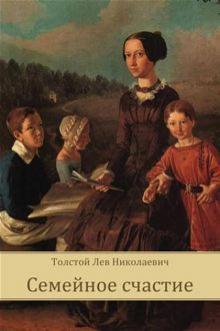 Family Happiness
Family Happiness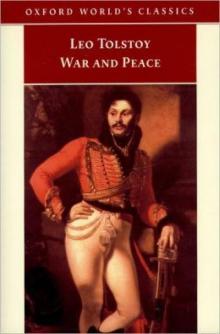 War and Peace
War and Peace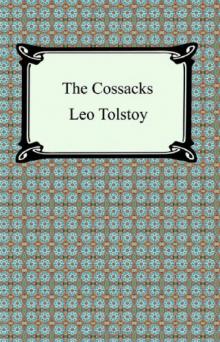 The Cossacks
The Cossacks The Kreutzer Sonata
The Kreutzer Sonata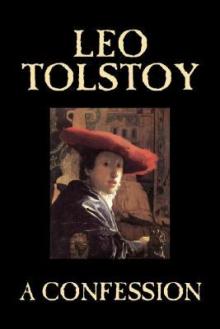 A Confession
A Confession The Kingdom of God Is Within You
The Kingdom of God Is Within You Father Sergius
Father Sergius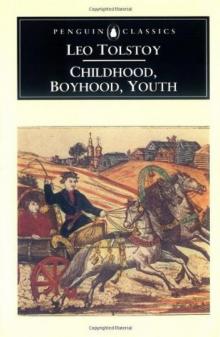 Childhood, Boyhood, Youth
Childhood, Boyhood, Youth Lives and Deaths
Lives and Deaths The Devil
The Devil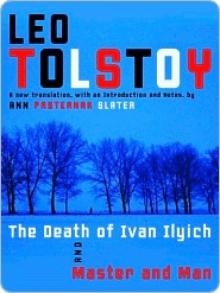 The Death of Ivan Ilyich and Master and Man
The Death of Ivan Ilyich and Master and Man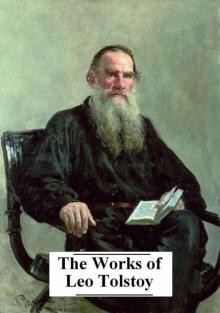 The Complete Works of Leo Tolstoy (25+ Works with active table of contents)
The Complete Works of Leo Tolstoy (25+ Works with active table of contents)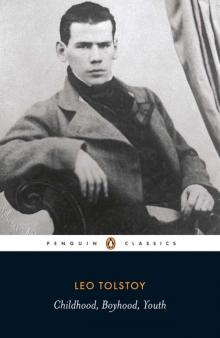 Childhood, Boyhood, Youth (Penguin ed.)
Childhood, Boyhood, Youth (Penguin ed.)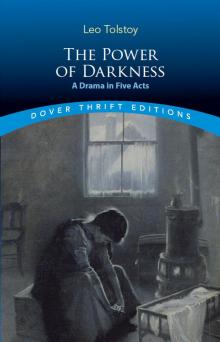 The Power of Darkness
The Power of Darkness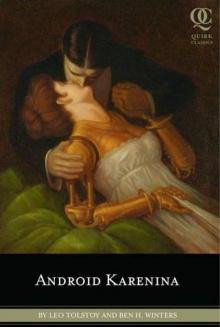 Android Karenina
Android Karenina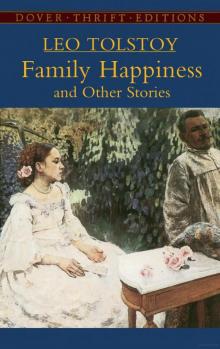 Family Happiness and Other Stories
Family Happiness and Other Stories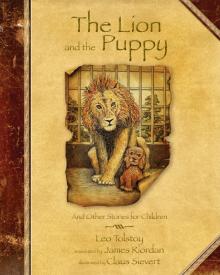 The Lion and the Puppy
The Lion and the Puppy Collected Shorter Fiction, Volume 2
Collected Shorter Fiction, Volume 2 Collected Shorter Fiction, Volume 1
Collected Shorter Fiction, Volume 1